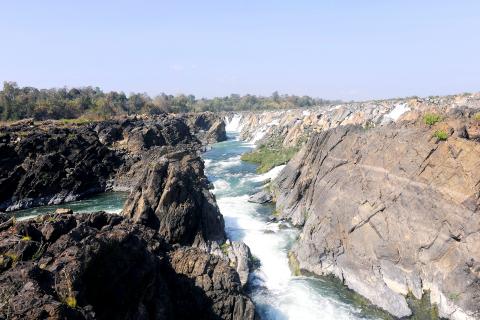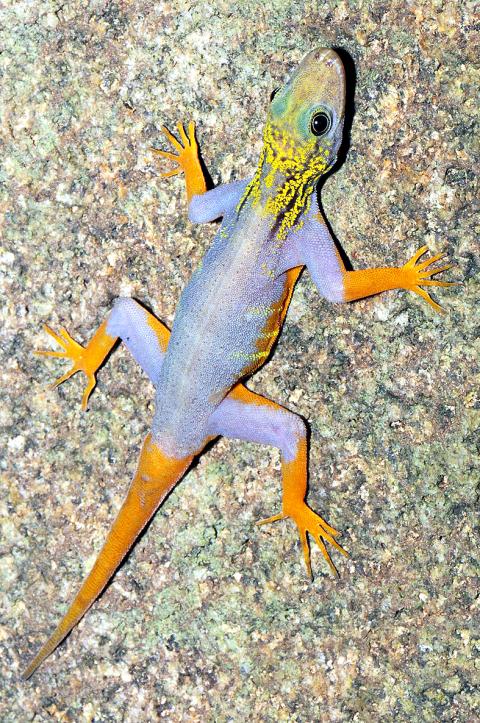Scientists identify a new species every two days in the Greater Mekong region, the WWF said yesterday, in a report detailing yesterday’s more unusual finds such as a leaf warbler and a self-cloning lizard.
However, the conservation group warned some species could disappear before they are ever recorded because of manmade pressures in the Southeast Asian area, described in the report as “one of the last frontiers” for new discoveries.
More than 200 species were newly recorded last year in the Greater Mekong, which includes Thailand, Cambodia, Myanmar, Vietnam, Laos and the southwestern Chinese province of Yunnan.

Photo: EPA/World Wildlife Fund Cambodia
Some, such as the snub-nosed monkey found in Myanmar’s remote Kachin state, were already known to local communities, but never previously identified by the scientific community.
A species of all-female lizard, which reproduces via cloning without the need for males, was spotted by a scientist by chance on the menu in a Vietnamese restaurant.
Sarah Bladen, spokeswoman for WWF Greater Mekong, based in Hanoi, said despite the number of new species found, the region faced “an extinction crisis.”

Photo: EPA/World Wildlife Fund Cambodia
“Unless these countries start to see biodiversity as something to be valued and invested in, we risk losing wild places and wild species at an extraordinary rate,” she said.
The list, dominated by plants, included 28 reptiles and seven amphibians, such as a vibrantly spotted newt species and a psychedelic gecko.
The only new bird found last year was the tiny limestone leaf warbler, so-called because it breeds in limestone karsts in Laos and has a loud, unique call — the sign that alerted researchers to a potential new find.
“While these discoveries highlight the unique biodiversity of the Greater Mekong, they also reveal the fragility of this region’s diverse species and habitats,” the WWF report said.
It noted “urgent reminders” such as the dramatic 70 percent drop in wild tiger numbers in little over a decade and the extinction of the Javan rhino in Vietnam last year.
“Rapid, unsustainable development and climate change impacts are profoundly affecting biodiversity and ecosystem services and consequently the millions of people who depend on them,” it added.
The report comes days after Thailand, Cambodia, Vietnam and Laos delayed a decision on a proposed hydropower dam on the Mekong River, which activists warn would seriously threaten several unique species in the waterway.
WWF called on the six leaders of the Greater Mekong Subregion, meeting later this month in Myanmar, to prioritize biodiversity, warning that otherwise “the region’s treasure trove of biodiversity will be lost.”

Kehinde Sanni spends his days smoothing out dents and repainting scratched bumpers in a modest autobody shop in Lagos. He has never left Nigeria, yet he speaks glowingly of Burkina Faso military leader Ibrahim Traore. “Nigeria needs someone like Ibrahim Traore of Burkina Faso. He is doing well for his country,” Sanni said. His admiration is shaped by a steady stream of viral videos, memes and social media posts — many misleading or outright false — portraying Traore as a fearless reformer who defied Western powers and reclaimed his country’s dignity. The Burkinabe strongman swept into power following a coup in September 2022

TRUMP EFFECT: The win capped one of the most dramatic turnarounds in Canadian political history after the Conservatives had led the Liberals by more than 20 points Canadian Prime Minister Mark Carney yesterday pledged to win US President Donald Trump’s trade war after winning Canada’s election and leading his Liberal Party to another term in power. Following a campaign dominated by Trump’s tariffs and annexation threats, Carney promised to chart “a new path forward” in a world “fundamentally changed” by a US that is newly hostile to free trade. “We are over the shock of the American betrayal, but we should never forget the lessons,” said Carney, who led the central banks of Canada and the UK before entering politics earlier this year. “We will win this trade war and

‘FRAGMENTING’: British politics have for a long time been dominated by the Labor Party and the Tories, but polls suggest that Reform now poses a significant challenge Hard-right upstarts Reform UK snatched a parliamentary seat from British Prime Minister Keir Starmer’s Labor Party yesterday in local elections that dealt a blow to the UK’s two establishment parties. Reform, led by anti-immigrant firebrand Nigel Farage, won the by-election in Runcorn and Helsby in northwest England by just six votes, as it picked up gains in other localities, including one mayoralty. The group’s strong showing continues momentum it built up at last year’s general election and appears to confirm a trend that the UK is entering an era of multi-party politics. “For the movement, for the party it’s a very, very big

SUPPORT: The Australian prime minister promised to back Kyiv against Russia’s invasion, saying: ‘That’s my government’s position. It was yesterday. It still is’ Left-leaning Australian Prime Minister Anthony Albanese yesterday basked in his landslide election win, promising a “disciplined, orderly” government to confront cost-of-living pain and tariff turmoil. People clapped as the 62-year-old and his fiancee, Jodie Haydon, who visited his old inner Sydney haunt, Cafe Italia, surrounded by a crowd of jostling photographers and journalists. Albanese’s Labor Party is on course to win at least 83 seats in the 150-member parliament, partial results showed. Opposition leader Peter Dutton’s conservative Liberal-National coalition had just 38 seats, and other parties 12. Another 17 seats were still in doubt. “We will be a disciplined, orderly